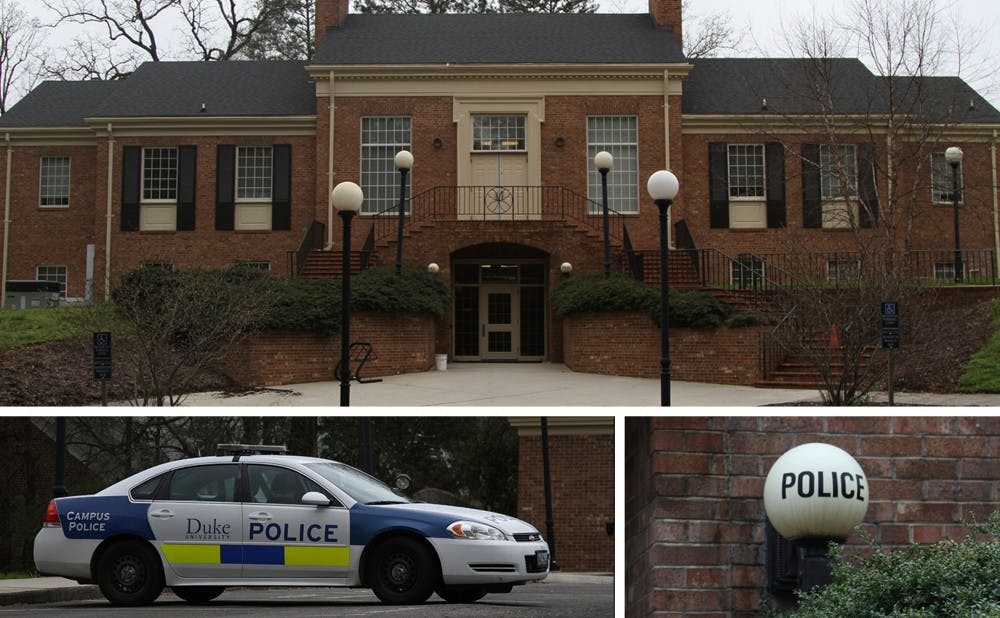Several legal experts have suggested that the Duke University Police Department may have improperly handled the investigation involving Executive Vice President Tallman Trask and contract parking attendant Shelvia Underwood.
In August 2014, Trask hit Underwood with his car, and Underwood claims that Trask then used a racial slur against her. DUPD filed an incident report at Underwood’s request, but took no further action against Trask. When Underwood asked for a copy of the incident report, DUPD initially refused her request, claiming that it was instituting a new system, Underwood said. DUPD eventually released the first page of its report, but has declined to release more information.
Legal experts interviewed by The Chronicle said DUPD may not have fulfilled its obligations under a North Carolina law that requires campus police to make available certain information about potential violations of the law that they have investigated. In particular, the experts noted that DUPD is required to properly describe any potential violation of the law that may have occurred during the reported incident. The report provided by DUPD has “concerned behavior” written as a description of the incident.
“To me that looks like an incomplete report,” said Jonathan Jones, instructor at Elon University and Director of the North Carolina Open Government Coalition. “Some of those things that they’re required to disclose are on the first page, but some of them are not there.”
Jones and Frayda Bluestein—David M. Lawrence distinguished professor of public law and government at the University of North Carolina at Chapel Hill—pointed to section 5.1 of the Campus Police Act, which requires that all campus police agencies, public and private, make available certain information about incidents that are reported to them. This includes basic information about the complainant, any arrests that were made and the incident itself.
The report released by DUPD details most of the required information, but the legal experts said it may not fulfill a requirement in the Campus Police Act to release information about the “nature of a violation or apparent violation of the law reported to the campus police agency.”
“One of the key things they have to disclose is the nature of the violation of the law that has been described to them,” Jones said. “It seems very clear that [Underwood] likely reported that she was hit by a car, which is something that needs to be investigated criminally, and that is something that should be made clear in the report.”
Bluestein noted that even if information about the nature of the incident is contained in records that DUPD is not required to make public, such as criminal investigation records or notes, DUPD is still obligated to release information in their records about the nature of the incident.
“There’s nothing in the statute that says they only have to give you the incident report,” she said. “If they have this information in other records, I would think they would be obligated to take the information off those records and give it to you.”
She added, however, that if DUPD continued to withhold further information about the nature of the incident, a lawsuit would likely be the only way to obtain the information.
Jeffrey Welty, associate professor of public law and government at the University of Carolina at Chapel Hill and Law School ‘99, said that although DUPD is a campus police department, it is still required to investigate any incident to the same extent as a municipal police department. A full investigation of the Trask incident would have involved interviews with each person involved in the incident as well as anyone who may have witnessed it. All of those interviews would have produced some records.
“In terms of the quality of investigation, you would have every right to expect the same quality of investigation from a campus department as you would from any other police department in North Carolina,” he said.
Welty added, however, that police departments have discretion in the types of incidents they investigate and in how thoroughly they investigate a given incident. In some cases, police departments may choose not to investigate an incident even if they are aware of a violation of the law. He pointed to alcohol law violations on college campuses as classic cases in which police officers may see violations of the law but choose not to conduct a full investigation.
The extent of this discretion is not well defined, Welty explained. There is no law that explicitly outlines when police must investigate an incident and how thorough their investigation must be. He noted, however, that there are potential conflicts of interest involved in an investigation of Trask, who indirectly supervises DUPD.
“I don’t know of a system by which they would analyze [potential conflicts of interest], but I think it’s a legitimate question,” he said.
Welty noted that in many cases municipal and state police departments will handle investigations of their superiors in a special way. In some cases, they will bring in an outside police department to conduct the investigation to avoid any perception of a conflict of interest. DUPD did not bring in an outside agency for the Trask case.
DUPD Chief of Police John Dailey said in an interview with the Student Press Law Center that DUPD has already released the information required under state law.
“We can’t always believe what’s in a student newspaper,” Dailey said in the interview. “Nobody releases the full report.”
In response to an email citing the Campus Police Act and asking for a further description of the Trask incident, Dailey wrote in an email that The Chronicle’s citation of the Campus Police Act was “inaccurate,” but did not elaborate.
“We are simply following the law,” Dailey wrote.
Rachel Chason contributed reporting.
Get The Chronicle straight to your inbox
Signup for our weekly newsletter. Cancel at any time.

